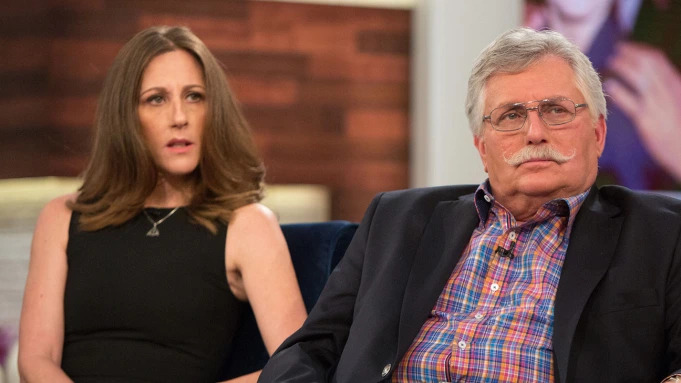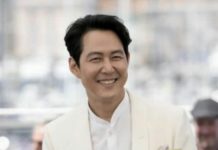
It has been nearly three decades since Fred Goldman and daughter Kim Goldman were transformed almost overnight into reluctant celebrities amid almost inconceivable grief for Ron Goldman — their son and brother, respectively. Ron was a 25-year-old tennis instructor and waiter who was murdered, along with Nicole Brown Simpson, outside her Brentwood home on July 12, 1994. Ron was there to return a pair of sunglasses that Nicole’s mother had left at his restaurant — but in a dark twist, he came upon Nicole’s murder scene and met the same fate.
What followed was dubbed the Trial of the Century, with Nicole’s estranged husband, NFL star turned actor O.J. Simpson, ultimately being found not guilty of either killing. A civil lawsuit in 1997 did find Simpson liable for both deaths and awarded the Goldmans millions in damages — less than 1 percent of which they say has been recouped. Simpson, now 74, later went to jail for a 2007 gunpoint robbery of sports memorabilia in Las Vegas. He was released in 2017, having served nine years. He currently lives in the Las Vegas home of a friend and regularly shares his thoughts about current events on Twitter.
Ahead of the June 11 debut of her new podcast from Kast Media called Media Circus, Kim Goldman, now 50, agreed to sit alongside her father, now 81, for a wide-ranging The Hollywood Reporter interview covering everything from the Simpson trial to the true-crime industry that sprung out of it and the latest celebrity-trial obsession, Johnny Depp v. Amber Heard.
You were discussing the Jan. 6 committee hearings when I entered the room. Let’s start there. What do you make of them?
FRED GOLDMAN Someone said, “At some point, presenting facts, presenting information, becomes irrelevant when you’re dealing with people’s emotions and what they feel in their heart to be true.” I found that to be really compelling because we are in an age where there are mass amounts of misinformation. It doesn’t necessarily help move the truth along sometimes when you have people that are just unwilling.
That idea applies to what your family went through — that the truth became quite secondary to what people’s belief system was.
FRED I would agree with that. But as long as there is someone that is willing to be the perpetrator of the non-truths, then that will always happen. In the case of the trial, it was the defense attorneys who were willing to do the lying and spread the falsehoods.
KIM GOLDMAN We’re coming up on 30 years almost. Despite the tremendous amounts of information and facts and pictures and documentation and testimony, people still dismiss it and cast aspersions on what the facts are, because they don’t want to believe that their beloved football player could have done something so heinous.
How many millions were the Gold-mans awarded in the civil suit against O.J. Simpson?
KIM Between all of us, it was $31 million. The rest was for the Browns. It’s almost $90 million now.
FRED It increases by 10 percent every year. It’s a ridiculous number, none of which has ever appeared.
You haven’t seen a dollar of it?
FRED No, he’s never paid one single penny. Anything that we were able to take was through our own efforts of taking things away from him.
Like what?
KIM When the If I Did It book [an infamous “hypothetical” confessional and accompanying TV special that earned Simpson $600,000 before being cancelled by HarperCollins and Fox network] was taken from him, it got put into bankruptcy court. We were ordered to publish that book. Everybody that he ever owed money to throw their IOU into the kitty, and any money that was raised from the publication of that book was used to pay off all the people that he owed money to. A very small portion of that was toward our judgment. I don’t really think that there was that much beyond that.
His real estate holdings? Nothing there?
KIM He moved to Florida, which is a debtor-friendly state. So all of his assets are protected by the homestead laws in Florida. As well as his retirement funds and any of his pensions. Everything was protected.
FRED He had a team of attorneys that basically helped him hide assets. When all is said and done, we received a court ruling that he was responsible for Ron’s and Nicole’s death, which was the ultimate important issue. The victims are always the important issue.
This podcast you’re doing, Kim — Media Circus. Could you explain the premise?
KIM It’s taking high-profile cases and talking to people directly impacted by mass media. It’s taking private tragedy and the public eye, and discussing the impact of being the subject of countless television shows and interviews and phone calls and a barrage of journalists over the years, how it impacts or impedes one’s ability to heal and recover and get justice, or not get justice.
What was your own experience of being under that glare and then, years later, seeing it come up in the Simpson documentary O.J.: Made in America and the FX series The People v. O.J. Simpson: American Crime Story?
KIM It was really difficult to be monitored all the time, and scrutinized and watched and characterized and judged. That you have a whole country, globally as well, that had this mass fascination with this case, which, to us, was just our loved ones. We didn’t get it. The fact that 28 years later it still garners such incredible attention is bewildering to me. It has been hard. It has been wonderful. It’s been ugly. It’s been supportive. It’s been isolating. I think it really just runs the gamut of every emotion that you could possibly imagine. You do that with the whole world watching. It’s surreal to even try to discuss.
FRED As the whole world watches, I would find myself in a position of being asked the question, and I would have to measure how I responded so as not to offend. Which is bizarre that you had to think in those terms about something that was so public.
Fred, you were a new media archetype to me — one of pure rage and sorrow and grief in the pursuit of justice. I hadn’t seen a person like that on TV or in the media before. What do you make of who you became in the media?
FRED At the time, what I would find is we’re sitting in the courtroom, and something would occur, and I would nearly explode. What ultimately would occur is I could walk out of the courtroom, and there was a bevy of reporters and a place down in the lobby where all the interviews would take place. Personally, I could pretty much say what I felt at the time. That was, for me, a very positive thing because I didn’t have to keep it in and let it fester inside. I could let it out. It ultimately was a good thing for me.
KIM There’s a tremendous amount of negativity that came with my dad speaking out, because people were like, “Oh, look how angry he is. Look, he’s always yelling. Look at how pissed off he is. He’s calling people names.” There was a dis-connect between that emotion and understanding that it was warranted and that it was appropriate.
Every time your dad was on TV crying and furious, that’s when you remembered this is not entertainment. This is people’s lives.
KIM But not everybody felt that way. It became so far removed from my brother and Nicole, and then the extensions of us, that it became about the killer. It became about Johnnie Cochran. It became about Marcia Clark. It became about everything other than the victims. People felt that they had ownership of it.
FRED It wasn’t that long ago in Arizona, I spoke at a function. As I often do, I discuss the issue of guns. A few days later, I got a letter in the mail. It was signed. The man’s name, address, phone, number, everything. He proceeded to blame me for Ron’s death because I didn’t arm my son with a gun with which he could have protected himself. This man went on to say that I was to blame for my son’s death because I didn’t believe in everybody carrying a gun. Here’s this lunatic assigning his own beliefs to something that occurred many years ago, just because he could.
With the rise since the trial of true crime as a big-money entertainment genre, I just wonder what you feel about people profiting off of that.
FRED I think the bottom line is we’re taking about the victimization of people, whether they’re being sexually abused, murdered, et cetera, and we’re turning it into a money-making system, ignoring the fact that people are being harmed, killed, et cetera. That seems to be the less important issue, but making profit on it seems to be more important.
I think sometimes we forget that, in addition to the actual victim of a crime, there’s a multitude of additional victims, family members, loved ones, friends, et cetera, that are affected by the crime and the victimization of someone. People seem to forget that everybody that’s harmed has a family, has close people that are re-victimized.
I am curious if you watched any of the Johnny Depp-Amber Heard trial, which similarly became a national obsession involving celebrity? Some feel the ruling marked the end of the #MeToo era and was a ruling against women, really. I’m wondering if you have opinions on that.
FRED Well, I don’t because I didn’t pay any attention to it.
KIM What I walked away from is watching two people that were in a toxic situation that the whole world was exposed to, and now everybody has a say. Now memes are going. People are being ridiculed and mocked. It really just became something grotesque to me. I think it does a disservice to victims and survivors that are actually contemplating coming forward with their allegations, whether it’s a multimillionaire celebrity or their boss.
Turning our thoughts back to Ron, could you tell me something about him that we might not know about him?
FRED Ron’s in my thoughts literally every day. Every day. I carry pictures of him still. I have pictures of him in my home. There is not a day that goes by that I don’t remember him or that something happens that doesn’t bring him and things he did back to life, so to speak. It never goes away. He never goes away.
Where do you live now?
FRED I live in Arizona, outside of Phoenix. We’ve been here for a whole bunch of years. We’ve been in our current home for 16 years. We’ve been in Arizona for something like 24 years.
KIM I still live in the Los Angeles area.
Do you avoid Brentwood?
KIM Yes. I have not been back to Brentwood [since the murder]. You have to intentionally go into Brentwood. You can’t accidentally stumble upon it, for the most part. I have had two experiences there, once when we had to get a suit from my brother to bury him and to clean out his apartment, and then one time on a blind date. My blind date accidentally drove through Brentwood, and I had an anxiety attack. It’s very easy for me to avoid Brentwood. It’s too painful.




